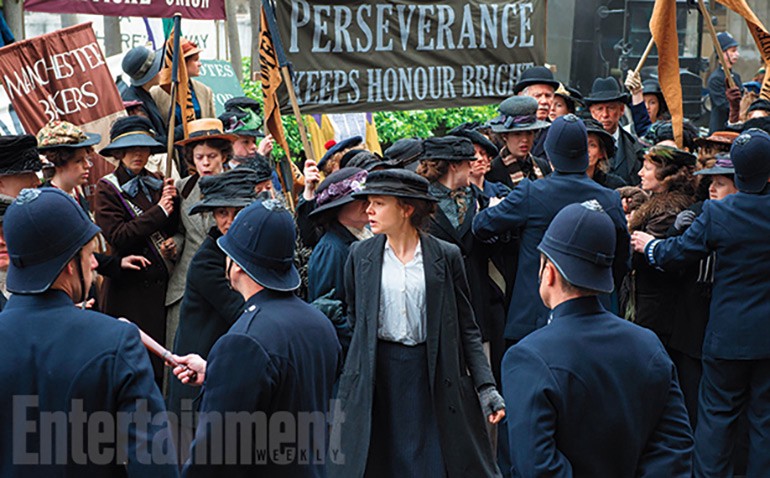Each September brings severe disappointment for those of us interested in seeing women taken seriously in the Oscar race. And by that, I mean women on screen and behind the scenes. It seems that the conversation for some time has been about important men doing important historical things and changing the world, while the contributions of women were made as wives and assistants. They weren’t the center of the action. It is worth noting that, last year, none of the best-picture nominees had a female protagonist and only one had a female director.
“Suffragette” bursts onto the screen and shows the power and presence of women in history. AND it is written, directed and produced by women. It is a movie that shows us a struggle that few know anything about — the women’s battle for the vote in the UK — but that is resonant today, in this country, because of the assault to voting rights going on right now. It is a reminder that, not too long ago, women had no power, no access to money and were thought to lack the brains to participate in issues related to governance. We still have much to do on the issue of women’s rights. Girls around the world are not being educated because they are girls. Girls are sold into marriage. Women are not allowed to leave their homes in places, women are still raped and assaulted everywhere and we are not paid equally.
Carey Mulligan beautifully plays Maud Watts, a poor, uneducated woman who has been working at the neighborhood laundry full-time since she was a teen. Her life is grueling, yet seemingly happy, with her son and her marriage to Sonny (Ben Whishaw), who also works at the laundry. Maud’s life is a regiment with no expectation for change.
And then the light bulb goes on. Maud is exposed to the suffrage movement, which at that moment is about to escalate into violence. We see her political awakening. Nothing looks the same anymore. She no longer tolerates the handsy lech who runs the laundry, she questions her husband and their prescribed roles and she becomes aware that the pharmacist (who is the local medical professional) Edith Ellyn (Helena Bonham Carter) could not go to medical school because she is a woman.
You see her excitement and fear at discovering something that becomes imbued throughout her body. She is also educated by Anne-Marie Duff, a fellow laundress, in a heartbreaking performance that reminds us that domestic violence and reproductive rights were also issues that desperately needed to be addressed. The turning point for the film is when we see Emmeline Pankhurst (Meryl Streep in a brilliant three-minute performance) egg on the women to take the fight to the next level. She incites them to burn and break and do anything they need to (aside from harming individuals) to get more attention and make the country take notice. Her short time on screen ratchets up the issue and challenges the women to take their commitment to a place where many wind up in jail, endure beatings and are vilified by their communities.
Maud pays a huge price for her activism. She loses everything that is near and dear to her. Everything. She becomes a pariah, yet she continues. The brilliance of creating a composite like Maud to lead this film is that she is everywoman. Maud shows us that change does not happen overnight. It is made through the incremental, everyday moments where people say “no more” and stand up and fight for change. It is about how we, as individuals, no matter where we start and where we come from, can be a part of making the world a better place for all of us. This is a movie steeped in history, but never feels like a history lesson. You feel the passion and the timeliness all throughout the script.
(Side note: This is a very white movie. It is important to acknowledge that, as a movement, feminism is constantly struggling with intersectionality and that all the current fights for voting rights, at least in this country, have been against communities of color and low-income communities. This movie is a historical piece. At the screening I attended, the writer and director both addressed the lack of women of color and spoke about the archival footage and research done to make this historically accurate.)
Director Sarah Gavron takes her filmmaking to new levels with this deeply personal film that she spent 10 years making. This was the first film to shoot in the Houses of Parliament. All the women involved in this film, from writer Abi Morgan to producers Faye Ward and Alison Owen, understand what a breakthrough this can be both for potential box-office and award success.
I can’t help but think that a movie like this will have enormous resonance in the industry this awards season. This film, as well as several other strong films (most all the rest directed by men), will challenge the Academy folks to look at women on screen in a different way this year. As Cate Blanchett said, this is not about women having a moment. This is about having women being taken seriously on a regular basis in the high-profile conversations of the film business.






